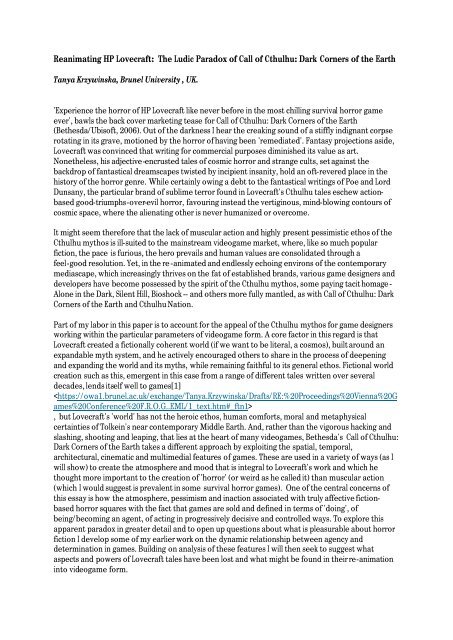Krzywinska_Reanimating HP Lovecraft
Krzywinska_Reanimating HP Lovecraft
Krzywinska_Reanimating HP Lovecraft
You also want an ePaper? Increase the reach of your titles
YUMPU automatically turns print PDFs into web optimized ePapers that Google loves.
<strong>Reanimating</strong> <strong>HP</strong> <strong>Lovecraft</strong>: The Ludic Paradox of Call of Cthulhu: Dark Corners of the Earth<br />
Tanya <strong>Krzywinska</strong>, Brunel University , UK.<br />
'Experience the horror of <strong>HP</strong> <strong>Lovecraft</strong> like never before in the most chilling survival horror game<br />
ever', bawls the back cover marketing tease for Call of Cthulhu: Dark Corners of the Earth<br />
(Bethesda/Ubisoft, 2006). Out of the darkness I hear the creaking sound of a stiffly indignant corpse<br />
rotating in its grave, motioned by the horror of having been 'remediated'. Fantasy projections aside,<br />
<strong>Lovecraft</strong> was convinced that writing for commercial purposes diminished its value as art.<br />
Nonetheless, his adjective-encrusted tales of cosmic horror and strange cults, set against the<br />
backdrop of fantastical dreamscapes twisted by incipient insanity, hold an oft-revered place in the<br />
history of the horror genre. While certainly owing a debt to the fantastical writings of Poe and Lord<br />
Dunsany, the particular brand of sublime terror found in <strong>Lovecraft</strong>'s Cthulhu tales eschew actionbased<br />
good-triumphs-over-evil horror, favouring instead the vertiginous, mind-blowing contours of<br />
cosmic space, where the alienating other is never humanized or overcome.<br />
It might seem therefore that the lack of muscular action and highly present pessimistic ethos of the<br />
Cthulhu mythos is ill-suited to the mainstream videogame market, where, like so much popular<br />
fiction, the pace is furious, the hero prevails and human values are consolidated through a<br />
feel-good resolution. Yet, in the re -animated and endlessly echoing environs of the contemporary<br />
mediascape, which increasingly thrives on the fat of established brands, various game designers and<br />
developers have become possessed by the spirit of the Cthulhu mythos, some paying tacit homage -<br />
Alone in the Dark, Silent Hill, Bioshock -- and others more fully mantled, as with Call of Cthulhu: Dark<br />
Corners of the Earth and Cthulhu Nation.<br />
Part of my labor in this paper is to account for the appeal of the Cthulhu mythos for game designers<br />
working within the particular parameters of videogame form. A core factor in this regard is that<br />
<strong>Lovecraft</strong> created a fictionally coherent world (if we want to be literal, a cosmos), built around an<br />
expandable myth system, and he actively encouraged others to share in the process of deepening<br />
and expanding the world and its myths, while remaining faithful to its general ethos. Fictional world<br />
creation such as this, emergent in this case from a range of different tales written over several<br />
decades, lends itself well to games[1]<br />
<br />
, but <strong>Lovecraft</strong>'s 'world' has not the heroic ethos, human comforts, moral and metaphysical<br />
certainties of Tolkein's near contemporary Middle Earth. And, rather than the vigorous hacking and<br />
slashing, shooting and leaping, that lies at the heart of many videogames, Bethesda's Call of Cthulhu:<br />
Dark Corners of the Earth takes a different approach by exploiting the spatial, temporal,<br />
architectural, cinematic and multimedial features of games. These are used in a variety of ways (as I<br />
will show) to create the atmosphere and mood that is integral to <strong>Lovecraft</strong>'s work and which he<br />
thought more important to the creation of 'horror' (or weird as he called it) than muscular action<br />
(which I would suggest is prevalent in some survival horror games). One of the central concerns of<br />
this essay is how the atmosphere, pessimism and inaction associated with truly affective fictionbased<br />
horror squares with the fact that games are sold and defined in terms of 'doing', of<br />
being/becoming an agent, of acting in progressively decisive and controlled ways. To explore this<br />
apparent paradox in greater detail and to open up questions about what is pleasurable about horror<br />
fiction I develop some of my earlier work on the dynamic relationship between agency and<br />
determination in games. Building on analysis of these features I will then seek to suggest what<br />
aspects and powers of <strong>Lovecraft</strong> tales have been lost and what might be found in their re-animation<br />
into videogame form.
Tanya <strong>Krzywinska</strong> is Professor in Screen Studies at Brunel University. She is the author of several<br />
books and many articles on different aspects of videogames, horror and fantasy and is particularly<br />
interested in occult fiction and fantasy worlds. She is the co-author of Tomb Raiders and Space<br />
Invaders: Videogames Forms and Meanings (IB Tauris, 2006), Sex and the Cinema (Wallflower, 2006),<br />
A Skin For Dancing In: Witchcraft, Possession and Voodoo in film (2001), and co-editor of ScreenPlay:<br />
Cinema/Videogames/Interfaces (Wallflower Press, 2002) and videogame/player/text (MUP, 2007).<br />
She convenes a Masters programme in Digital Games: Theory and Design at Brunel University,<br />
London, and is President of the Digital Games Research Association.<br />
She can be contacted at Tanya.krzywinska@brunel.ac.uk<br />
________________________________<br />
[1]<br />
<br />
A tabletop roleplaying game entitled Call of Cthulhu was published in 1981 by Chaosium and is still<br />
going strong.<br />
Prof. Tanya <strong>Krzywinska</strong><br />
Convener MA Digital Games Theory and Design<br />
President DIGRA www.digra.org <br />
*MA Digital Games Theory and Design*<br />
http://www.brunel.ac.uk/courses/pg/cdata/d/Digital+Games+Theory+and+Design+MA<br />





